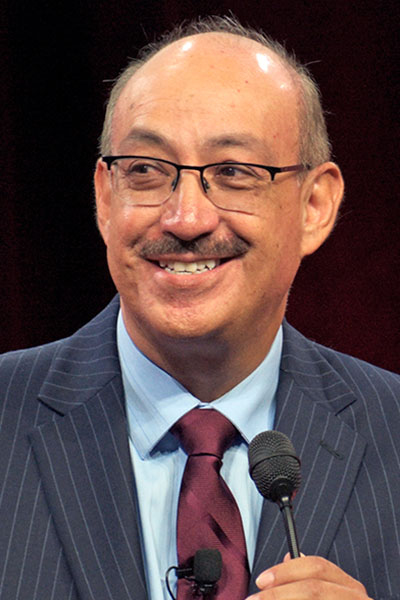
Caballero, MD
In order to optimize diabetes care and achieve better outcomes, diabetes education and prevention programs must be thoughtfully designed and tailored to “speak to” the different audiences for which they are intended, according to A. Enrique Caballero, MD, the recipient of the 2023 Outstanding Educator in Diabetes Award from the American Diabetes Association® (ADA). In his address to Scientific Sessions attendees, Dr. Caballero stressed the importance of recognizing and listening to all stakeholder voices in the continuum of diabetes care.
“Although we have heard the voices of many players in diabetes care for a long time, it seems we have not carefully listened to their unmet needs, and we keep working in our own silos,” Dr. Caballero said. “We are falling short in helping the vast majority of people living with the disease.”
Dr. Caballero’s address, Outstanding Educator in Diabetes Award Lecture—Optimal Diabetes Care through Listening to Multiple Voices, can be viewed by registered meeting participants at ADA2023.org. If you haven’t registered for the 83rd Scientific Sessions, register today to access the valuable meeting content through August 28.
Dr. Caballero is Associate Professor of Medicine, Faculty Director of International Innovation Programs in the Office for External Education, and Faculty Director of Diabetes Education in the Postgraduate Medical Education Department at Harvard Medical School. He is Director of Latino Diabetes Health in the Division of Endocrinology, Diabetes and Hypertension and Associate Scientist in the Division of Global Health Equity at the Brigham and Women’s Hospital. He also currently serves as the Chair for the Health Care Disparities Committee at the ADA.
“In order to improve outcomes for people with diabetes, we must improve our ability to listen to multiple voices, beginning with the most important voices, our patients,” Dr. Caballero said. “To do more for all of them, we need to first listen carefully to their needs and then act by providing them with concrete solutions to their challenges.”
Those challenges can include factors related to social determinants of health, as well as psychological and multiple cultural factors that can play a major role in a patient’s health status.
“They all have their unmet needs and they all can voice very valid concerns,” Dr. Caballero said. “But the truth is that in most cases, we end up providing them with general recommendations on eating better, exercising more, testing their blood sugars more often, and adjusting their pharmacological treatments. We know well that is not going to be enough to help most patients achieve treatment goals.”
That reality, he said, highlights the importance of the health care provider voice in the communication process and the need to improve education programs for providers that equip them to understand and address the barriers and challenges their patients face.
“It is crucial to listen to health care providers’ voices in the design of professional education programs. Education programs for providers should focus not just on medical science but also on its implementation in a wide range of settings,” Dr. Caballero said. “Fortunately, many medical schools like our own at Harvard have formally incorporated activities to train future doctors on the application of science to different populations by considering social and cultural determinants of health.”
In order to develop more effective diabetes education and prevention programs, other important voices that must be in the conversation include government agencies/entities, health insurance companies, pharmaceutical and medical device manufacturers, and community/grassroots organizations, he said.
“Professional organizations like the ADA and so many others around the world have long fought to provide us with accurate and updated information, standards of care, treatment guidelines, and have elevated their voices along with those of many patient advocacy groups to call everyone’s attention to diabetes,” he noted. “I know if we work together, we can do things better. I know if we listen to multiple voices, we will be better prepared to improve the lives of people living with diabetes.”